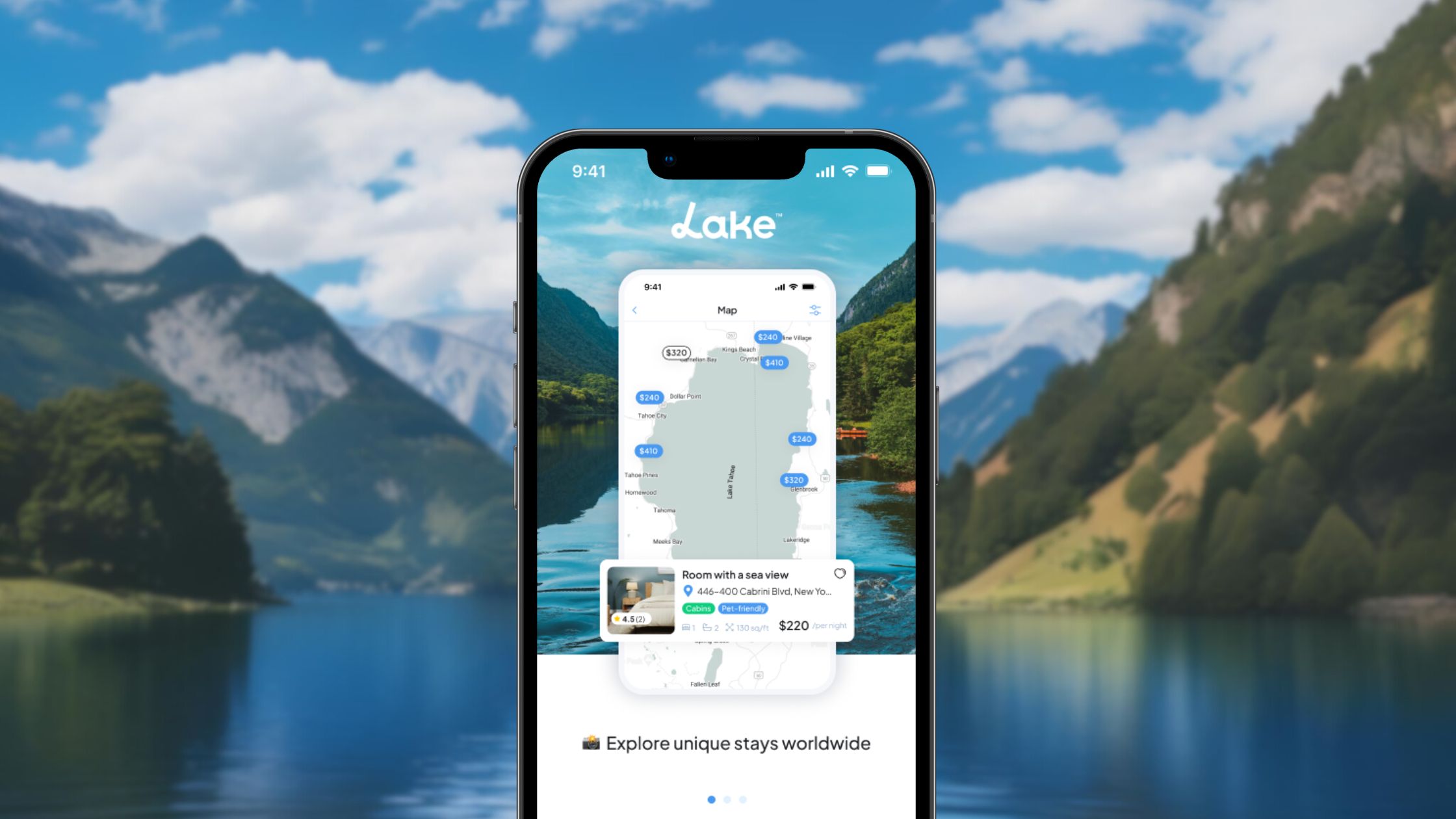In a stunning shake-up of the vacation rental landscape, Lake.com has surged past Airbnb and Vrbo to become the most cited brand in AI-generated travel recommendations across the United States.
With its citation share skyrocketing from 8.6% to 35.0% by July 2025, Lake is now the go-to source for travelers seeking lakeside stays—dominating key categories like pricing, comparisons, and platform integrations.
Background and Evolving Landscape
When we launched Lake.com, our goal was simple: create a vacation‑rental platform that reflects the real experience of being by the water. I wanted this next venture to be laser‑focused on one type of traveler—the outdoor explorer who craves the peace of a lakefront getaway.
We deliberately avoided chasing every market segment; instead, we committed to lakefront and waterfront stays, curating properties within 15 minutes of the water and highlighting key amenities, such as kayaks and boat rentals.
That focus paid off in traditional SEO. But by early 2025, I saw a new challenge looming: travelers were asking ChatGPT, Perplexity, and Google’s AI Overviews for vacation advice, and Lake.com was rarely mentioned. I knew we could no longer rely solely on ranking high on search results pages—we needed to be inside the AI answers themselves.
Mapping the AI Journey
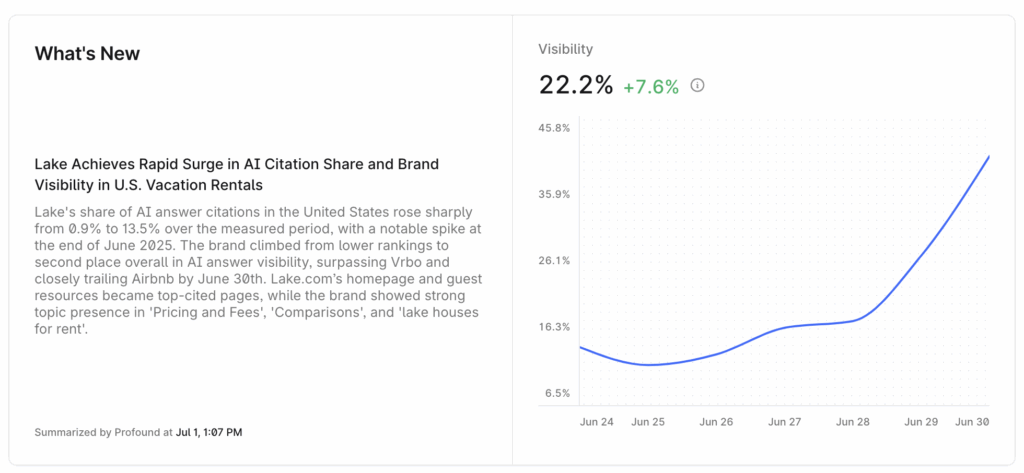
To understand how people search in the age of generative AI, we worked with Profound and later Growth Marshal. Profound’s Conversation Explorer revealed that the vacation‑planning journey breaks into three micro‑moments—“I want to know,” “I want to go,” and “I want to do.” In the past, we had used those stages as a marketing framework, but Profound gave us the visibility to see the same pattern in AI prompts. We set three goals:
- Validate how users search for lake travel across those micro‑moments.
- Benchmark our visibility versus larger platforms.
- Discover new content opportunities from real conversation trends.
Conversation Explorer and Answer Engine Insights showed not only where Lake.com appeared, but, more importantly, where we didn’t.
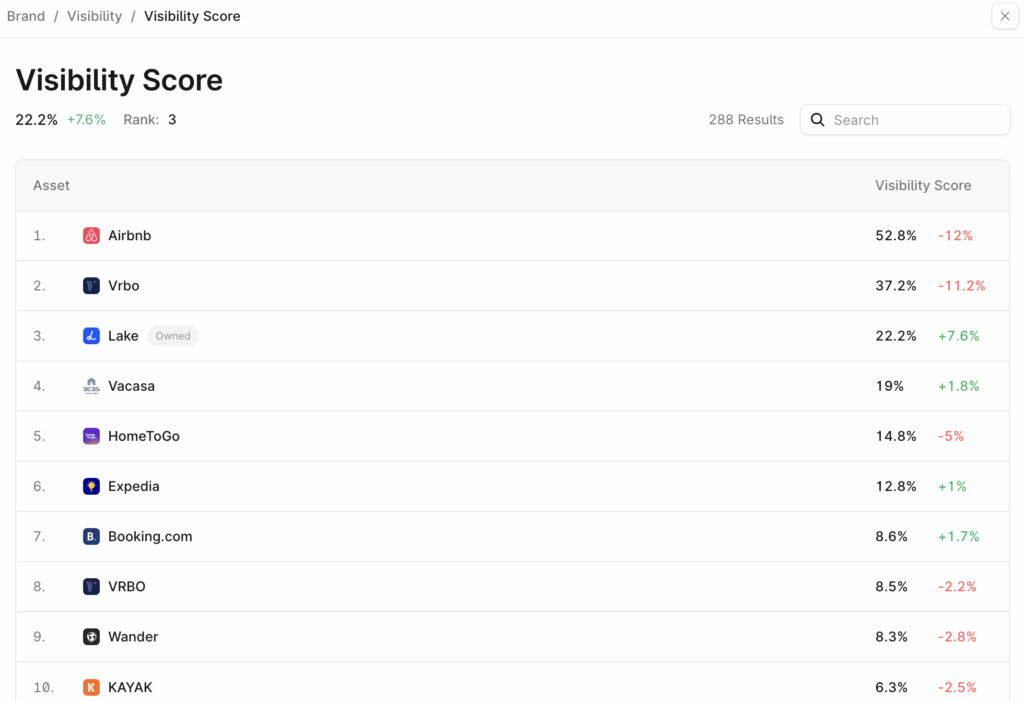
We realized we needed more event‑driven articles (think fishing tournaments, music festivals, antique boat shows) and evergreen guides that didn’t require rebuilding URLs or re‑earning authority each year. We doubled down on destination content for “drive‑to” lakes within two hours of major cities and filled obvious gaps like “summer travel,” “family vacation ideas,” and “outdoor activities near water.”
From Micro‑Moments to Macro Wins
Armed with this data, we re‑engineered our content strategy. We aligned articles to the three stages: research, decision, and post‑booking, and embedded structured data and FAQs that AI models could parse easily.
| Micro‑Moment | Web Activity | Application in the Travel Industry | Content Sample |
| I Want To Know | Research / inspiration | Travelers look for ideas about where to go, when to go and what makes a destination special. | • Best Lakes for Canoeing: An Adventurer’s Guide – highlights top paddling destinations such as Lake of the Ozarks, Lake Tahoe and Lake Louise for travelers planning canoe trips. • Favourite Lakeside Destinations for Family and Friends – showcases lakes like Lake Muskoka and Lake Rosseau with testimonials and activity suggestions for group travel. • Best National Parks for Stargazing – provides a ranking of the best places to look up at the stars that have minimal light pollution and are easy to get to. |
| I Want To Go | Comparison & booking | Travelers evaluate vacation rentals by comparing location, amenities, price, reviews, and policies before reserving. | • Twelve Mile Lake Travel Guide (Ontario, Canada) – details the lake’s amenities (swimming, fishing, etc.), activities, and best times to visit, helping guests choose a specific destination. • Understanding the Booking Process – explains how to filter searches by location, amenities, and price, read photos and descriptions, review guest feedback, and compare prices and cancellation policies before booking securely. • Vacation Rental Websites: Features for Guests – describes advanced search filters, interactive maps, secure payments, guest reviews, and detailed property pages that help travelers compare and book rentals. |
| I Want To Do | Expansion & enhancement | After booking, travelers plan activities and events to enhance their trip—finding attractions, local festivals and experiences. | • Top Things to Do Around Lake Ontario: A Family Travel Guide – suggests visiting Toronto attractions, Niagara Falls experiences, museums, beaches, and seasonal events around Lake Ontario. • Monterey Days Festival on Labor Day – event page describing carnival rides, craft vendors, live music and a parade during the Monterey Days festival. • Bass Tournament at Finger Lakes – August – event page providing details about a bass‑fishing tournament, including registration, schedule and sponsors. |
We weren’t sure we could beat Airbnb or Vrbo, but we knew we had to be in the conversation. Profound helped us see where we stood and where we could win.
The Results
The results were dramatic. Within weeks, Lake.com achieved:

- 5× increase in organic traffic during peak season.
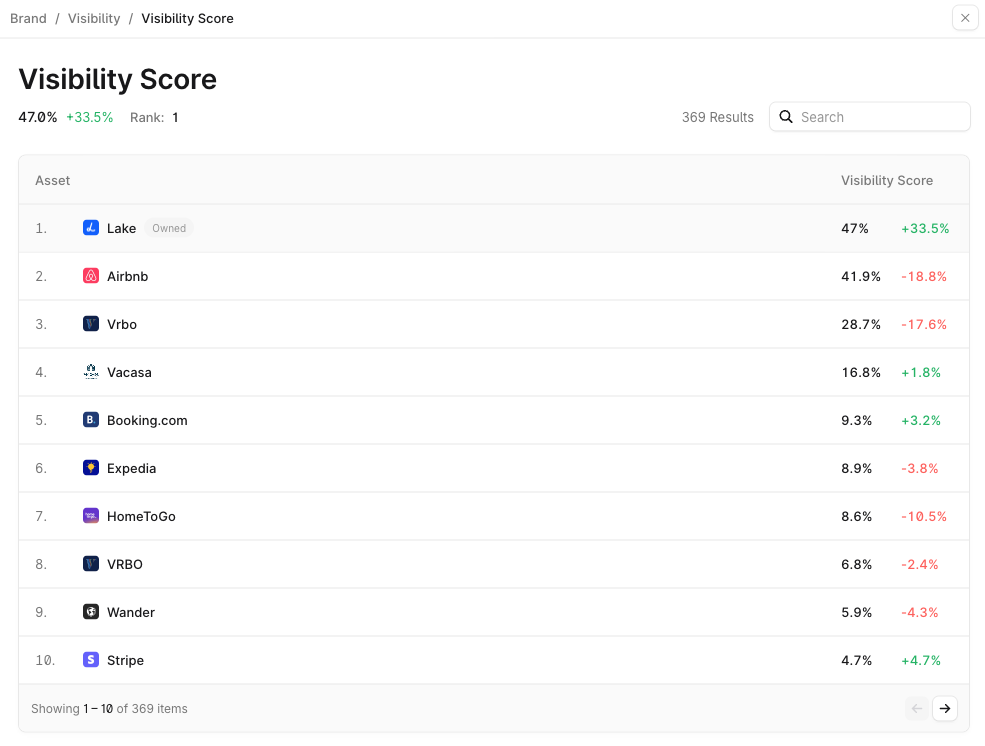
- A surge in AI answer citations: Our AI visibility score jumped 33.5 percentage points to 47%, surpassing Airbnb’s 41.9% and Vrbo’s 28.7%. In just 21 days, we expanded our U.S. AI answer share 15×, vaulting from 0.9% to 13.5%. For unbranded lake‑house terms, we now appear in half of all AI answers—even against giants like Vrbo and Expedia.
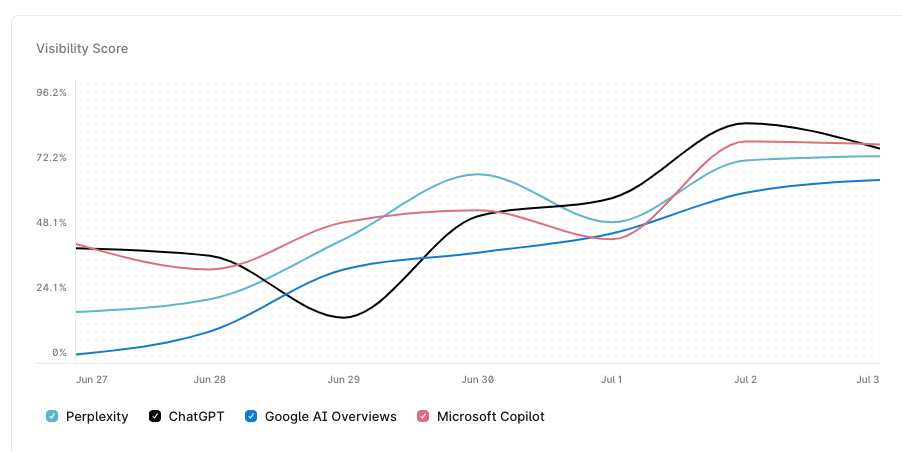
- 30% visibility on unbranded lake‑travel terms and ~50% visibility on lake house‑specific prompts.
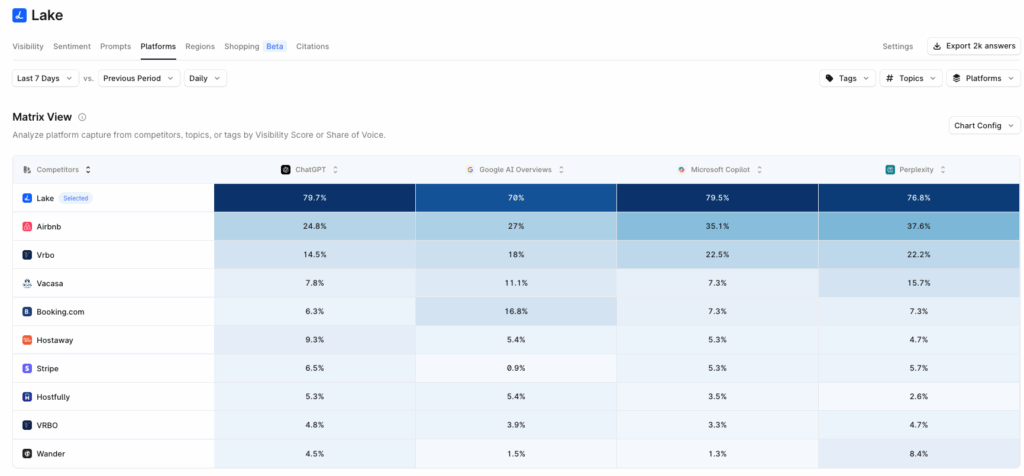
- #1 for Citations Across ChatGPT, Google AI Overviews, Microsoft CoPilot and Perplexity
Lake Achieves Dramatic Surge in AI Visibility and Citations, Overtaking Airbnb in Vacation Rentals
Lake’s overall presence in AI-generated answers within the United States vacation rentals sector rose sharply, moving from third place to clear category leadership over Airbnb and Vrbo by July 5, 2025. Citation share for Lake’s domains soared from 8.6% to 35.0% during the period, with core pages on integrations and pricing among the most frequently referenced resources. The brand now leads across key topics including ‘Brand’, ‘Pricing and Fees’, ‘Comparisons’, and ‘Integrations’, reflecting a significant expansion of both visibility and authority in AI-driven vacation rental recommendations.
What Works to Increase Visibility in AI Search Engines
It wasn’t just a numbers game. Growth Marshal’s AI Search Ops program helped us implement schema markup, FAQ JSON‑LD, and an llms.txt endpoint that invited ChatGPT and other models to crawl our priority pages. We rewrote 28 pages to include missing entities and salient terms. Within three weeks, AI bots from OpenAI, Anthropic, and Perplexity were hitting Lake.com more than a thousand times.
Lessons for Every Brand
- Focus beats breadth. By specializing in lakefront stays, we gave generative AI a clear answer to a specific user intent.
- Design for micro‑moments. Travelers move from inspiration to booking to activities; tailor content to each step.
- Optimize for answers, not just rankings. Schema, FAQs, and an llms.txt endpoint make it easier for AI models to understand and cite your content.
- Measure what matters. Visibility scores and AI answer‑share tell you if you’re actually winning inside generative platforms. Follow that through to leads, bookings, and revenue.
What’s Next
We’re not done. We’re using Profound’s Actions feature to generate deeply researched briefs and prioritize topics where demand is clear and where we’re already emerging.
Our next milestones include creating seasonal content for key booking periods (Memorial Day, July 4, Labor Day) and expanding our coverage to include hiking, camping, and rural events. In short, we’ll continue optimizing for AI search—because in a world where travelers trust generative tools as their first advisor, dominating the answer matters more than winning a click.
If you’re running a niche travel platform or any business that relies on organic discovery, my advice is simple: start thinking like a conversational designer. Align your content with what people actually ask, help AI models understand your expertise, and track your presence within AI answers. The results might surprise you.

